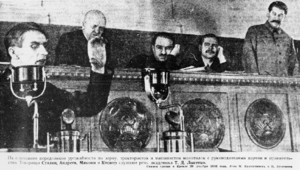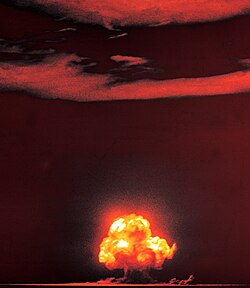Portal:History of science
The History of Science Portal
The history of science covers the development of science from ancient times to the present. It encompasses all three major branches of science: natural, social, and formal. Protoscience, early sciences, and natural philosophies such as alchemy and astrology during the Bronze Age, Iron Age, classical antiquity, and the Middle Ages declined during the early modern period after the establishment of formal disciplines of science in the Age of Enlightenment.
Science's earliest roots can be traced to Ancient Egypt and Mesopotamia around 3000 to 1200 BCE. These civilizations' contributions to mathematics, astronomy, and medicine influenced later Greek natural philosophy of classical antiquity, wherein formal attempts were made to provide explanations of events in the physical world based on natural causes. After the fall of the Western Roman Empire, knowledge of Greek conceptions of the world deteriorated in Latin-speaking Western Europe during the early centuries (400 to 1000 CE) of the Middle Ages, but continued to thrive in the Greek-speaking Byzantine Empire. Aided by translations of Greek texts, the Hellenistic worldview was preserved and absorbed into the Arabic-speaking Muslim world during the Islamic Golden Age. The recovery and assimilation of Greek works and Islamic inquiries into Western Europe from the 10th to 13th century revived the learning of natural philosophy in the West. Traditions of early science were also developed in ancient India and separately in ancient China, the Chinese model having influenced Vietnam, Korea and Japan before Western exploration. Among the Pre-Columbian peoples of Mesoamerica, the Zapotec civilization established their first known traditions of astronomy and mathematics for producing calendars, followed by other civilizations such as the Maya.
Natural philosophy was transformed during the Scientific Revolution in 16th- to 17th-century Europe, as new ideas and discoveries departed from previous Greek conceptions and traditions. The New Science that emerged was more mechanistic in its worldview, more integrated with mathematics, and more reliable and open as its knowledge was based on a newly defined scientific method. More "revolutions" in subsequent centuries soon followed. The chemical revolution of the 18th century, for instance, introduced new quantitative methods and measurements for chemistry. In the 19th century, new perspectives regarding the conservation of energy, age of Earth, and evolution came into focus. And in the 20th century, new discoveries in genetics and physics laid the foundations for new sub disciplines such as molecular biology and particle physics. Moreover, industrial and military concerns as well as the increasing complexity of new research endeavors ushered in the era of "big science," particularly after World War II. (Full article...)
Selected article -

Lysenkoism (Russian: лысенковщина, romanized: lysenkovshchina, IPA: [ɫɨˈsʲɛnkəfɕːɪnə]; Ukrainian: лисенківщина, romanized: lysenkivščyna, IPA: [lɪˈsɛnkiu̯ʃtʃɪnɐ]) was a political campaign led by the Soviet biologist Trofim Lysenko against genetics and science-based agriculture in the mid-20th century, rejecting natural selection in favour of a form of Lamarckism, as well as expanding upon the techniques of vernalization and grafting.
More than 3,000 mainstream biologists were dismissed or imprisoned, and numerous scientists were executed in the Soviet campaign to suppress scientific opponents. The president of the Soviet Agriculture Academy, Nikolai Vavilov, who had been Lysenko's mentor, but later denounced him, was sent to prison and died there, while Soviet genetics research was effectively destroyed. Research and teaching in the fields of neurophysiology, cell biology, and many other biological disciplines were harmed or banned. (Full article...)
Selected image

This famous color photograph of the "Trinity" shot, the first nuclear test explosion, was taken by Jack Aeby on July 16, 1945. Aeby was a member of the Special Engineering Detachment at Los Alamos National Laboratory, working under the aegis of the Manhattan Project.
Did you know
... that the Merton Thesis—an argument connecting Protestant pietism with the rise of experimental science—dates back to Robert K. Merton's 1938 doctoral dissertation, which launched the historical sociology of science?
...that a number of scientific disciplines, such as computer science and seismology, emerged because of military funding?
...that the principle of conservation of energy was formulated independently by at least 12 individuals between 1830 and 1850?
Selected Biography -
Niels Henrik David Bohr (7 October 1885 – 18 November 1962) was a Danish theoretical physicist who made foundational contributions to understanding atomic structure and quantum theory, for which he received the Nobel Prize in Physics in 1922. Bohr was also a philosopher and a promoter of scientific research.
Bohr developed the Bohr model of the atom, in which he proposed that energy levels of electrons are discrete and that the electrons revolve in stable orbits around the atomic nucleus but can jump from one energy level (or orbit) to another. Although the Bohr model has been supplanted by other models, its underlying principles remain valid. He conceived the principle of complementarity: that items could be separately analysed in terms of contradictory properties, like behaving as a wave or a stream of particles. The notion of complementarity dominated Bohr's thinking in both science and philosophy. (Full article...)
Selected anniversaries
- 1679 - Death of Jacques de Billy, French mathematician (b. 1602)
- 1684 - Birth of Johann Matthias Hase, German scientist (d. 1742)
- 1742 - Death of Edmond Halley, English scientist (b. 1656)
- 1898 - Death of Lewis Carroll, English writer and mathematician (b. 1832)
- 1901 - Death of Charles Hermite, French mathematician (b. 1822)
- 1905 - Death of Ernst Abbe, German physicist (b. 1840)
- 1966 - Death of Sergei Korolev, Russian rocket scientist (b. 1906)
- 1970 - Death of William Feller, Croatian mathematician (b. 1906)
- 1978 - Death of Kurt Gödel, Austrian mathematician (b. 1906)
- 1998 - Researchers in Dallas, Texas present findings about an enzyme that slows aging and cell death (apoptosis)
- 2001 - Death of Burkhard Heim, German physicist (b. 1925)
Related portals
Topics
General images
Subcategories
Things you can do
Help out by participating in the History of Science Wikiproject (which also coordinates the histories of medicine, technology and philosophy of science) or join the discussion.
Associated Wikimedia
The following Wikimedia Foundation sister projects provide more on this subject:
-
Commons
Free media repository -
Wikibooks
Free textbooks and manuals -
Wikidata
Free knowledge base -
Wikinews
Free-content news -
Wikiquote
Collection of quotations -
Wikisource
Free-content library -
Wikiversity
Free learning tools -
Wiktionary
Dictionary and thesaurus









































































